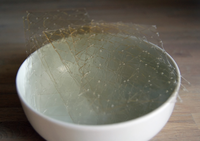
Photo from wikipedia
Although many types of technologies for hydrogel-based cell cultivation have recently been developed, strategies to integrate cell-adhesive micrometer-sized supports with bulk-scale hydrogel platforms have not been fully established. Here, we… Click to show full abstract
Although many types of technologies for hydrogel-based cell cultivation have recently been developed, strategies to integrate cell-adhesive micrometer-sized supports with bulk-scale hydrogel platforms have not been fully established. Here, we present a highly unique approach to produce cell-adhesive, protein-based microfibers assisted by the sacrificial template of alginate; we applied these fibers as microengineered scaffolds for hydrogel-based cell encapsulation. Two types of microfluidic devices were designed and fabricated: a single-layered device for producing relatively thick (Φ of 10−60 μm) alginate–protein composite fibers with a uniform cross-sectional morphology and a four-layered device for preparing thinner (Φ of ∼4 μm) ones through the formation of patterned microfibers with eight distinct alginate–protein composite regions. Following chemical cross-linking of protein molecules and the subsequent removal of the sacrificial alginate from the double-network matrices, microfibers composed only of cross-linked proteins were obtained. We used gelatin, albumin, and hemoglobin as the protein material, and the gelatin-based cell-adhesive fibers were further encapsulated in hydrogels together with the mammalian cells. We clarified that the thinner fibers were especially effective in promoting cell proliferation, and the shape of the constructs was maintained even after removing the hydrogel matrices. The presented approach offers cells with biocompatible solid supports that enhance cell adhesion and proliferation, paving the way for the next generation of techniques for tissue engineering and multicellular organoid formation.
Journal Title: ACS Omega
Year Published: 2020
Link to full text (if available)
Share on Social Media: Sign Up to like & get
recommendations!